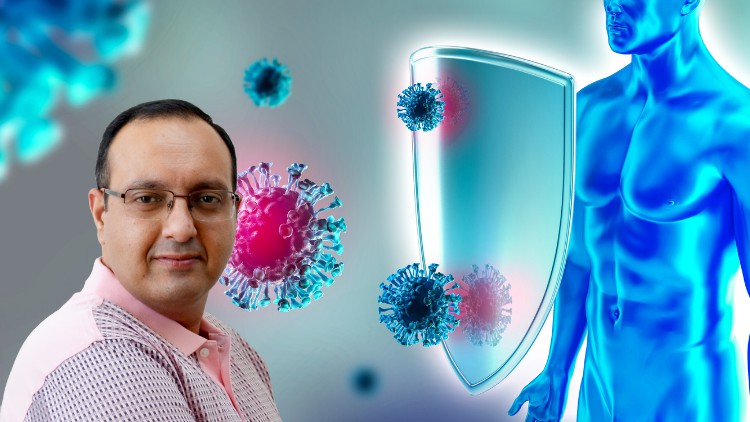
Master the principles of workings of the immune system.
What you will learn
The students will learn the core concepts of immunology relevant for understanding immune system.
After completing this course, students will be able to master how different components of vertebrate immune system work.
This course will help students understand how immune system malfunctions in diseases like allergies, autoimmune disorders, and cancer.
The course includes medically important topics like development of vaccines and immunotherapies for cancer.
The course covers material asked in USMLE Step 1 exam.
Description
Immune system is a fascinating innovation by living organisms to fend off infections by other organisms. Its evolutionary roots are ancient, and many of the components of immune system are conserved from plants to invertebrates to mammals. It has several amazing, awe-inspiring features, including the ability to recognize various classes of pathogens, recruitment of cells to kill bacteria, viruses, as well as infected cells, and last but not the least, the ability to distinguish self from non-self. Knowledge of how the immune system works has helped us in controlling many deadly diseases, including small pox, AIDS, polio, and cancer.
Although immune system is extremely useful to us, learning and mastering this subject can be tough, given the technical terms and huge amount of information the students have to remember and absorb. It sometimes discourages students to take up this subject, and some also lose interest along the way.
Albert Einstein once said, “Things should be made as simple as possible, but no simpler.” This course is designed along this line of thinking. It provides all the necessary details to understand the complex subject of immunology, while keeping the focus on the bigger picture and avoiding getting lost in the minutiae.
Here is a snapshot of what is in store for you:
Lecture 1 – Introduction to the subject and overview of main concepts
Lecture 2 – Cells of the Immune System
Lecture 3 – Primary and Secondary Lymphoid Organs
Lecture 4 – Innate Immunity
Lecture 5 – The Complement system
Lecture 6 – Antigens and Immunogens
Lecture 7 – Antibody Structure
Lecture 8 – Antibody Diversity
Lecture 9 – Immunological Techniques I – Making Antibodies
Lecture 10 – Immunological Techniques II – Antibody-based techniques
Lecture 11 – Immunological Techniques III – Flow Cytometry
Lecture 12 – Immunological Techniques IV – Western Blotting
Lecture 13 – Immunological Techniques V – Animal Models
Lecture 14 – MHC and Antigen Presentation
Lecture 15 – B Cell Development
Lecture 16 – B Cell Differentiation
Lecture 17 – Humoral Immunity
Lecture 18 – T Cell Development and Differentiation
Lecture 19 – Cell-mediated Immunity
Lecture 20 – Cytokines and Chemokines
Lecture 21 – Immunological Tolerance
Lecture 22 – Transplantation Immunology
Lecture 23 – Immunodeficiency diseases
Lecture 24 – Cancer Immunology
Lecture 25 – Cancer Immunotherapy
Lecture 26 – Hypersensitivity
Lecture 27 – Autoimmune Diseases
Lecture 28 – Vaccines
Lecture 29 – Immunology of COVID-19
Lecture 30 – Conclusion
By the end of this course, you’ll be able to apply the concepts you have learned in clinical as well as research settings. The concepts you learn in this course will help you in understanding research literature and keep up with the latest developments in immunology.